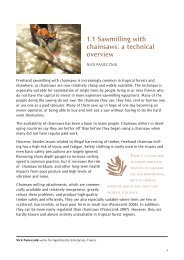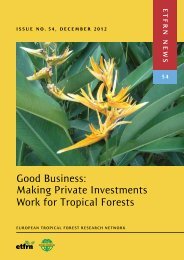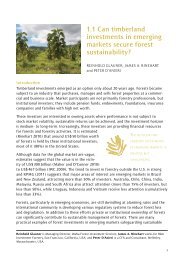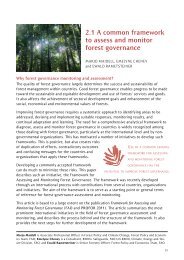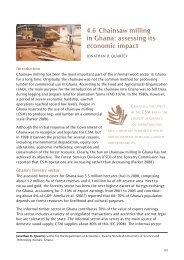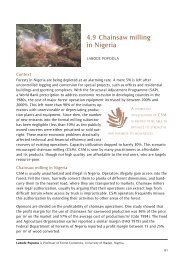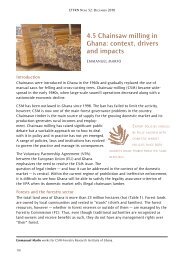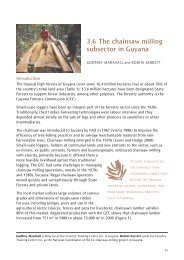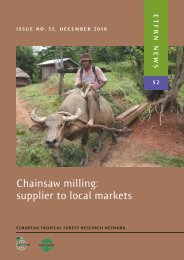Chainsaw milling: supplier to local markets - European Tropical ...
Chainsaw milling: supplier to local markets - European Tropical ...
Chainsaw milling: supplier to local markets - European Tropical ...
Create successful ePaper yourself
Turn your PDF publications into a flip-book with our unique Google optimized e-Paper software.
102<br />
ETFRN NEws 52: DEcEmbER 2010<br />
most Csm or ripping 2 is freehand. many opera<strong>to</strong>rs use the same chain as for felling the<br />
tree, although some use a special ripping chain or adapt a felling chain. many <strong>local</strong> forest<br />
authorities consider freehand cutting a waste of wood resources and are trying <strong>to</strong> convince<br />
chainsaw millers <strong>to</strong> use a frame and a guide bar, but with limited success. Those who<br />
have learned <strong>to</strong> cut freehand claim that it is faster and as precise as with a guide bar.<br />
Guide bars or “alaska mills” (see pho<strong>to</strong>, left) are often used by newcomers and less experienced<br />
cutters, although this varies from island <strong>to</strong> island. in Dominica, for example, only<br />
forest department chainsaw millers use guide bars; private<br />
chainsaw millers prefer <strong>to</strong> work freehand. in st. lucia and<br />
st. Vincent, guide frames are more common. The Forest administration<br />
of st. Vincent is introducing the logosol mill,<br />
which is highly precise. 3<br />
<strong>Chainsaw</strong> <strong>milling</strong> is often perceived as wasteful. although<br />
the kerf of a chainsaw cut is broader than that of a band<br />
saw or a circular saw, even freehand chainsawing can have a<br />
conversion rate of around 40% of lumber from a round log.<br />
in addition, conventional logging leaves behind some material<br />
— such as branches from large hardwood trees — which<br />
a chainsaw miller may be able <strong>to</strong> use for smaller boards for furniture-making. a good example<br />
is the use of Caoba or small-leaf mahogany (Swietenia mahogani) in the Dominican<br />
republic. its wood is now so rare and expensive that even small branches are converted<br />
in<strong>to</strong> boards <strong>to</strong> be sold <strong>to</strong> joineries. waste in processing is normally the result of low timber<br />
prices, so higher prices for raw material are likely <strong>to</strong> be more successful in reducing waste<br />
than any recommendation issued by national forest authorities (box 2).<br />
Box 2. cooperative efforts in Dominica<br />
a number of chainsaw millers in Dominica designed a system <strong>to</strong> encourage the more<br />
efficient use of timber: any wood left over from harvested trees was transported <strong>to</strong><br />
a central drying facility, which also served as a small lumber market. an nGo called<br />
the Cottage Forest industry was established as a cooperative <strong>to</strong> manage the drying<br />
facility, moni<strong>to</strong>r the quality of the processed lumber and help its members get a<br />
better price for their products. <strong>Chainsaw</strong> millers were also expected <strong>to</strong> carry out<br />
timber stand improvement, environmental education, water sampling and associated<br />
research within designated concession forests.<br />
while the idea of the Cottage Forest industry was excellent, it was not successful<br />
in practice. The association eventually ceased operating due <strong>to</strong> internal disputes<br />
and the fact that chainsaw millers were selling better quality products directly <strong>to</strong><br />
consumers and trying <strong>to</strong> sell the inferior material through Cottage Forest industry.<br />
a steep reduction in the demand for <strong>local</strong>ly produced lumber, due <strong>to</strong> a new furniture<br />
s<strong>to</strong>re on the island, also contributed <strong>to</strong> the decline of the association.



